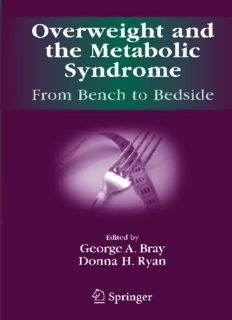
Overweight and the Metabolic Syndrome: From Bench to Bedside PDF
Preview Overweight and the Metabolic Syndrome: From Bench to Bedside
OVERWEIGHT AND THE METABOLIC SYNDROME: FROM BENCH TO BEDSIDE ENDOCRINEUPDATES ShlomoMelmed,M.D.,SeriesEditor J.A.Fagin(ed.):ThyroidCancer.1998.ISBN:0-7923-8326-5 J.S.AdamsandB.P.Lukert(eds.):Osteoporosis:Genetics, PreventionandTreatment.1998.ISBN:0-7923-8366-4. B.-Å.Bengtsson(ed.):GrowthHormone.1999.ISBN:0-7923-8478-4 C.Wang(ed.):MaleReproductiveFunction.1999.ISBN:0-7923-8520-9 B.RapoportandS.M.McLachlan(eds.):Graves’Disease: PathogenesisandTreatment.2000.ISBN:0-7923-7790-7. W.W.deHerder(ed.):FunctionalandMorphologicalImaging oftheEndocrineSystem.2000.ISBN0-7923-7923-9 H.G.Burger(ed.):SexHormoneReplacementTherapy.2001. ISBN0-7923-7965-9 A.Giustina(ed.):GrowthHormoneandtheHeart.2001. ISBN0-7923-7212-3 W.L.Lowe,Jr.(ed.):GeneticsofDiabetesMellitus.2001. ISBN0-7923-7252-2 J.F.HabenerandM.A.Hussain(eds.):MolecularBasisofPancreas DevelopmentandFunction.2001.ISBN0-7923-7271-9 N.Horseman(ed.):Prolactin.2001.ISBN0-7923-7290-5 M.Castro(ed.):TransgenicModelsinEndocrinology.2001 ISBN0-7923-7344-8 R.Bahn(ed.):ThyroidEyeDisease.2001.ISBN0-7923-7380-4 M.D.Bronstein(ed.):PituitaryTumorsinPregnancy ISBN0-7923-7442-8 K.SandbergandS.E.Mulroney(eds.):RNABindingProteins: NewConceptsinGeneRegulation.2001.ISBN0-7923-7612-9 V.GoffinandP.A.Kelly(eds.):HormoneSignaling.2002 ISBN0-7923-7660-9 M.C.SheppardandP.M.Stewart(eds.):PituitaryDisease.2002 ISBN1-4020-7122-1 N.ChattopadhyayandE.M.Brown(eds.):Calcium-SensingReceptor. 2002.ISBN1-4020-7314-3 H.VaudryandA.Arimura(eds.):PituitaryAdenylateCyclase- ActivatingPolypeptide.2002.ISBN1-4020-7306-2 R.C.Gaillard(ed.):TheACTHAXIS:Pathogenesis,Diagnosis andTreatment.2003.ISBN1-4020-7563-4 P. Beck-Peccoz (ed.): Syndromes of Hormone Resistance on the Hypothalamic- Pituitary-ThyroidAxis.2004.ISBN1-4020-7807-2 E.Ghigo(ed.):Ghrelin.2004.ISBN1-4020-7770-X C.B.Srikant(ed.):Somatostatin.2004.ISBN1-4020-7799-8 V.D.CastracaneandM.C.Henson(eds.):Leptin.2006.ISBN0-387-31415-6 G.A.BrayandD.H.Ryan(eds.):OverweightandtheMetabolicSyndrome.2006. ISBN0-387-32163-2 OVERWEIGHT AND THE METABOLIC SYNDROME: FROM BENCH TO BEDSIDE Edited by George A. Bray, MD Pennington Biomedical Research Center Louisiana State University System Baton Rouge, Louisiana, USA Donna H. Ryan, MD Pennington Biomedical Research Center Louisiana State University System Baton Rouge, Louisiana,USA GeorgeA.Bray,MD DonnaH.Ryan,MD PenningtonBiomedicalResearchCenter PenningtonBiomedicalResearchCenter LouisianaStateUniversity LouisianaStateUniversity 6400PerkinsRoad 6400PerkinsRoad BatonRouge,LA,USA BatonRouge,LA,USA OVERWEIGHTANDTHEMETABOLICSYNDROME: FROMBENCHTOBEDSIDE LibraryofCongressControlNumber:2006922024 ISBN-10:0-387-32163-2e-ISBN-10:0-387-32164-0 ISBN-13:978-0387-32163-9e-ISBN-13:978-0387-32164-6 Printedonacid-freepaper. ©2006SpringerScience+BusinessMedia,LLC Allrightsreserved.Thisworkmaynotbetranslatedorcopiedinwholeorinpartwithoutthe writtenpermissionofthepublisher(SpringerScience+BusinessMedia,Inc.,233SpringStreet, New York, NY 10013, USA), except for brief excerpts in connection with reviews or schol- arlyanalysis.Useinconnectionwithanyformofinformationstorageandretrieval,electronic adaptation,computersoftware,orbysimilarordissimilarmethodologynowknownorhereafter developedisforbidden. Theuseinthispublicationoftradenames,trademarks,servicemarksandsimilarterms,evenif theyarenotidentifiedassuch,isnottobetakenasanexpressionofopinionastowhetheror nottheyaresubjecttoproprietaryrights. Whiletheadviceandinformationinthisbookarebelievedtobetrueandaccurateatthedate of going to press, neither the authors nor the editors nor the publisher can accept any legal responsibilityforanyerrorsoromissionsthatmaybemade.Thepublishermakesnowarranty, expressorimplied,withrespecttothematerialcontainedherein. PrintedintheUnitedStatesofAmerica. 987654321 springer.com Contents Preface xv Contributors xix Chapter1:NeuroendocrineControlofFoodIntake AndrewA.Butler,JamesL.TrevaskisandChristopherD.Morrison 1 1. Introduction 1 2. CentralNervousSystemRegulationofFeedingBehavior 2 3. NeuroendocrineFactorsSecretedfromtheGut 2 3.1. Cholecystokinin 3 3.2. PeptideYY 5 3.3. Ghrelin 6 3.4. Amylin 7 3.5. Enterostatin 7 3.6. Glucagon-likePeptide 8 3.7. BombesinFamily:Bombesin,Gastrin-releasingPeptideandNeuromedinB 8 3.8. Oxyntomodulin 9 3.9. Leptin 10 4. NeuroendocrineIndicatorsofLong-termEnergyBalance:LeptinandInsulin 10 4.1. LeptinandInsulinSignalinginDiet-inducedObesity 12 5. Summary 13 References 13 Chapter2:BodyCompositionAssessmentofObesity Wm.CameronChumlea 23 1. Introduction 23 2. OverviewofBodyCompositionMethods 24 2.1. Anthropometry 24 2.2. WeightandStature 24 2.3. BodyMassIndex 25 2.4. AbdominalCircumference 26 2.5. Skinfolds 27 2.6. BioelectricImpedanceAnalysis 28 vi Contents 2.7. BodyDensity 29 2.8. TotalBodyWater 29 2.9. Dual-energyx-rayAbsorptiometry 29 3. EthnicDifferencesinBodyComposition 30 4. AvailableReferenceData 30 5. Recommendations 31 6. Conclusion 31 Acknowledgments 32 References 32 Chapter3:PrevalenceofObesityandtheMetabolicSyndrome AliH.MokdadandEarlS.Ford 37 1. OverweightandObesity 37 2. PreventionandControlPrograms 44 3. THEMetabolicSyndrome 45 4. PreventiveandControlStrategies 47 5. FuturePerspectives 48 References 49 Chapter4:TheGeneticContributiontoObesity RaulA.Bastarrachea,JackW.KentJr.,JeffT.Williams,Guowen Cai,ShelleyA.ColeandAnthonyG.Comuzzie 55 1. Introduction 55 2. ObesityasaCommonComplexPhenotype 56 3. AncientGenesinaModernWorld:AnEvolutionaryGeneticPerspectiveonObesity 57 4. ApproachestoObesityGeneDiscovery 58 4.1. CandidateGeneAssociationStudy 59 4.2. GenomeScan 59 4.3. mRNA 60 5. EvidencefromAnimalModelsfortheGeneticContributiontoObesity 60 5.1. MonogenicObesity 60 5.2. OligogenicObesity 62 6. EvidencefortheGeneticContributiontoObesityinHumans 63 6.1. TheGeneticContributiontoRareFormsofHumanObesity 63 6.2. GeneticContributiontoCommonHumanObesity 66 7. Conclusion 72 Acknowledgments 73 References 73 Contents vii Chapter5:EtiologyofObesity:TheProblemofMaintainingEnergy Balance BarryE.LevinandDeborahJ.Clegg 83 1. Introduction:ObesityandtheConceptofDefendedBodyWeight 83 2. NeuralControloftheDefendedBodyWeight 85 3. ObesityandtheProblemofMaintainingBodyWeight 88 4. HowIsBodyWeightReallyRegulated? 90 5. FactorsThatLowertheDefendedBodyWeight 91 6. ImplicationsforFutureResearch 91 References 92 Chapter6:CurrentViewsoftheFatCellasanEndocrineCell: Lipotoxicity TamaraTchkonia,BarbaraE.CorkeyandJamesL.Kirkland 105 1. Introduction 105 2. FunctionsofFatTissue 105 3. ConditionsAssociatedwithLipotoxicity 106 4. MechanismsofLipotoxicity 108 5. InherentPropertiesofCellsContributetoSusceptibilitytoLipotoxicity 111 6. AssociationbetweenLipidsandInflammatoryResponses 111 7. MechanismsofDefenseagainstLipotoxicity 112 8. PreadipocytesandFatCellsAremoreResistantthanOtherCellTypestoFA 114 9. Summary 116 10. Conclusions 117 Acknowledgments 118 References 118 Chapter7:EctopicFatandtheMetabolicSyndrome FredericoG.S.ToledoandDavidE.Kelley 125 1. Introduction 125 2. ConsequencesofExcessAdipositytoWhole-bodyGlucoseHomeostasis 126 3. FFA-inducedInsulinResistance 127 4. EctopicFatinSkeletalMuscleandInsulinResistance 128 5. RelationshipsbetweenEctopicFatinLiverandInsulinResistance 129 6. HumanLipodystrophicSyndromes 130 7. ConcludingRemarks 131 References 132 Chapter8:AbdominalObesityandtheMetabolicSyndrome Jean-PierreDesprés,IsabelleLemieuxandNatalieAlméras 137 1. Introduction 137 2. MetabolicSyndromewithoutHyperglycemiaPredictsanInreasedCHDRisk 140 viii Contents 3. WhyMeasureWaistCircumferenceaswellandnotjustBMI? 141 4. AbdominalObesity:TheDrivingForcebehindtheMetabolicSyndrome? 143 5. TheMetabolicSyndrome:IsWaistGirthSufficient? 143 6. AreNCEP-ATPIIICriteriaValidinAllPopulations? 144 7. ManagingCHDRiskinPatientswiththeMetabolicSyndrome:WhatShouldBe OurGoal? 145 8. Summary 146 Acknowledgments 148 References 148 Chapter9:TheProblemsofChildhoodObesityandtheMetabolic Syndrome SoniaCaprioandRamWeiss 153 1. Introduction 153 2. PrevalenceoftheMetabolicSyndromeinChildrenandAdolescents:Impactof Obesity 154 3. EffectsofInsulinResistance(HOMA-IR)onthePrevalenceoftheMetabolic Syndrome 155 4. ProinflammatoryandAntiinflammatoryMarkersandInsulinResistance 158 5. PathophysiologicalStudiesofthePrediabeticPhenotypeinYouth 159 6. RelationshipbetweenInsulinResistanceandTissueLipidPartitioning 160 7. EarlyReductionofβ-cellSensitivitytoGlucoseinObeseYouthwithImpaired GlucoseTolerance 162 8. LongitudinalStudyofChangesinGlucoseToleranceStatusinObeseYouth 164 Acknowledgments 165 References 165 Chapter10:EvaluationoftheOverweightandObesePatient GeorgeA.BrayandDonnaH.Ryan 169 1. Introduction 169 2. Definitions 170 3. AnthropometricMeasures 170 3.1. HeightandWeight 170 3.2. WaistCircumference 170 4. InstrumentalMethodsforMeasuringBodyFat 171 4.1. DualX-rayAbsorptiometry 172 4.2. Density 172 4.3. IsotopeDilution 173 4.4. BioelectricImpedance 173 5. ImagingTechniquesforBodyComposition 173 6. SummaryofClinicalRecommendationsforMeasurementofBodyComposition 173 7. BodyFatthroughtheLifeSpan 173 8. PrevalenceofOverweight 174 Contents ix 9. ClinicalEvaluationofOverweightPatients 176 9.1. BodyMassIndex 176 9.2. WaistCircumference 178 9.3. WeightGain 178 9.4. SedentaryLifestyle 178 9.5. LaboratoryandOtherMeasures 179 10. TheMetabolicSyndrome 179 11. EtiologicFactorsUnderlyingObesity 180 12. IntroductiontoTreatment:Risk–BenefitAssessment 183 13. Conclusion 183 References 184 Chapter11:DietaryApproachestoObesityandtheMetabolic Syndrome GaryD.FosterandAngelaP.Makris 187 1. Introduction 187 2. Low-fatDiets 188 2.1. EfficacyofLow-fatDietsonWeightLoss,Hypertension,andDiabetes 188 3. Very-low-fatDiets 191 3.1. EfficacyofVery-low-fatDietsonWeightLossandCardiovascularDisease 191 4. Moderate-fatDiets 192 4.1. EfficacyofModerate-fatDietsonWeightLoss,CardiovascularDisease,and Diabetes 193 5. TheHigh-proteinDiet 195 5.1. EfficacyofHigh-proteinDietsonWeightLoss 196 6. Low-carbohydrateDiets 198 6.1. EfficacyofLow-carbohydrateDietsonWeightLoss,InsulinSensitivity,and Lipids 198 7. LowGlycemicIndexDiet 202 7.1. EffectsofLowGlycemicIndexDietsonHungerandWeightLossand InsulinSensitivity 202 8. ClinicalImplicationsandFutureDirectionsforResearch 205 References 205 Chapter12:ExerciseasanApproachtoObesityandtheMetabolic Syndrome JohnM.JakicicandAmyD.Otto 211 1. Introduction 211 2. EffectofExerciseonHealth-relatedParameters 211 3. ImpactofExerciseonWeightLoss 213 4. ExercisePrescriptionConsiderationsforLong-termWeightControl 214 5. Summary 216
Description: